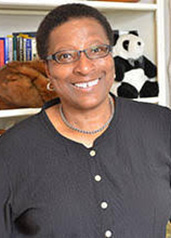Teach, embody, and model deep listening and reflection
February 10, 2020
This post is republished from Into Practice, a biweekly communication of Harvard’s Office of the Vice Provost for Advances in Learning
 Cheryl Giles, Francis Greenwood Peabody Senior Lecturer in Pastoral Care and Counseling, shares her own experiences, missteps, and successes to demonstrate self-awareness for students in her course Counseling for Wellness and Resilience: Fostering Relational Wisdom. She encourages students to listen deeply to themselves and others without judgment by practicing mindfulness throughout the course.
Cheryl Giles, Francis Greenwood Peabody Senior Lecturer in Pastoral Care and Counseling, shares her own experiences, missteps, and successes to demonstrate self-awareness for students in her course Counseling for Wellness and Resilience: Fostering Relational Wisdom. She encourages students to listen deeply to themselves and others without judgment by practicing mindfulness throughout the course.
The benefits: “Students learn how to hold multiple perspectives to be true,” explains Giles. A major goal of this course is to teach future counselors to work with people who may have different views—whether on the political or religious spectrum—without being reactive. To become ready for this kind of work takes self-exploration, time, failure, and reflection.
The challenges: A common challenge Giles observes stems from students entering the course looking for immediate, concrete, step-by-step strategies for counseling. Giles stresses the importance of being present and sitting with whatever comes up in the moment and notes that developing confidence and learning to listen deeply requires patience and practice.
Takeaways and best practices
- Practice mindfulness. Both during and outside of class, students engage in mindfulness exercises, including compassion meditations, followed by open-ended reflection papers. They learn to better articulate a range of feelings—from numbness to rage—and work through their own experiences to build a strong foundation to help others through trauma. Giles asks them to listen to and sit with themselves first, arguing that they “need to create a foundation before they can do the work with others.”
- Provide feedback. Giles’ students practice and receive feedback on their counseling skills through exercises like fishbowls during class time. In addition, she asks them “What are you noticing? What’s happening in the present moment? What’s happening within you?” to build their capacity for self-reflection.
- Offer your own experiences. Giles shares her setbacks and failures with students to help them understand the importance of vulnerability and growth in this work. Being open with students about all aspects of her journey provides them with a model for authenticity and a path toward self-awareness.
Bottom line: Given the current tense climate of the world, students can be quick to focus on disagreements between groups. Giles strives to develop a strong classroom community where the focus is on internal development, building a foundation of compassion and understanding so that students can bridge across such differences and use those skills in their work.

